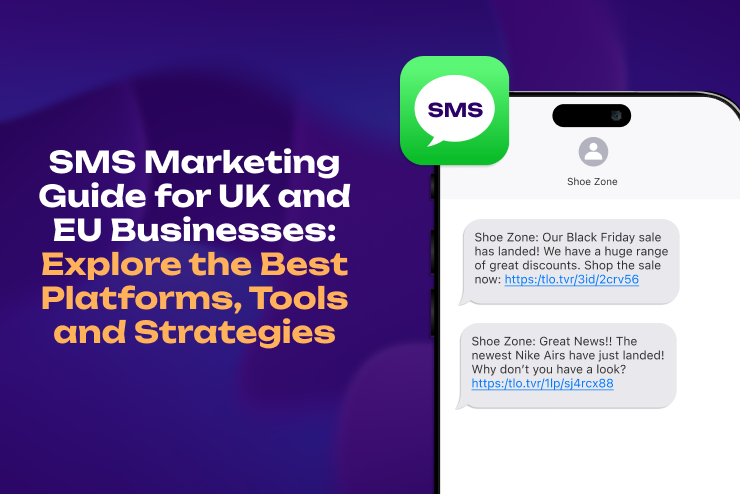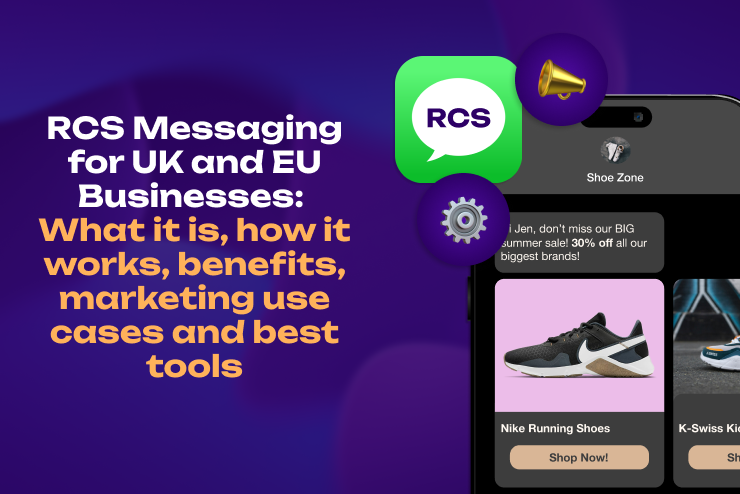Why Cyber Monday is Equally, If Not More Important Than Black Friday
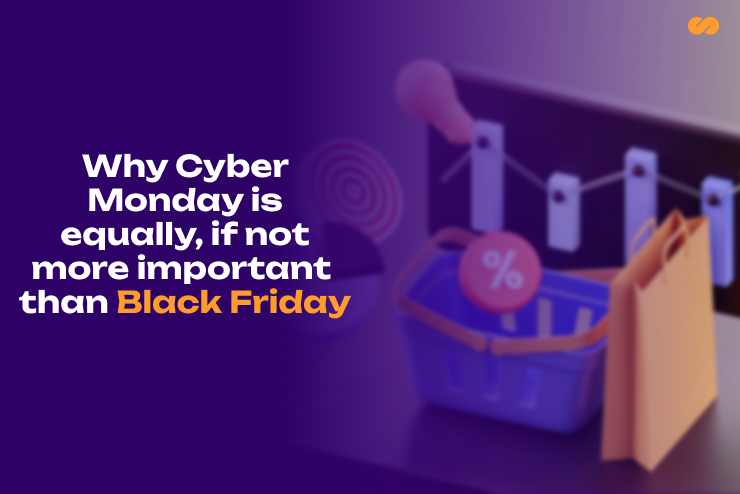
Black Friday is considered to be the jewel in the retail calendar, creating a surge in sales as the year draws to a close. However, in recent years, Cyber Monday has slowly inched closer to taking the title of the biggest shopping day of the year. In the U.S. alone, sales surpassed $13.3 billion on Cyber Monday in 2024, setting a new record.
We’re delving into the history of Cyber Monday and exploring how it has evolved over the past two decades. As well as looking at ways that you can prepare for the annual shopping frenzy.
When did Cyber Monday start?
This year marks the 20th anniversary of the inception of Cyber Monday. The National Retail Federation originally coined the term to highlight the surge in online sales on the Monday following the Thanksgiving weekend.
What began as a marketing initiative to encourage consumers to buy online has now become one of the biggest shopping days of the year. Due to its popularity, many retailers now run Cyber Week deals to maximise end-of-year sales in the lead-up to Christmas.
Cyber Monday over the years
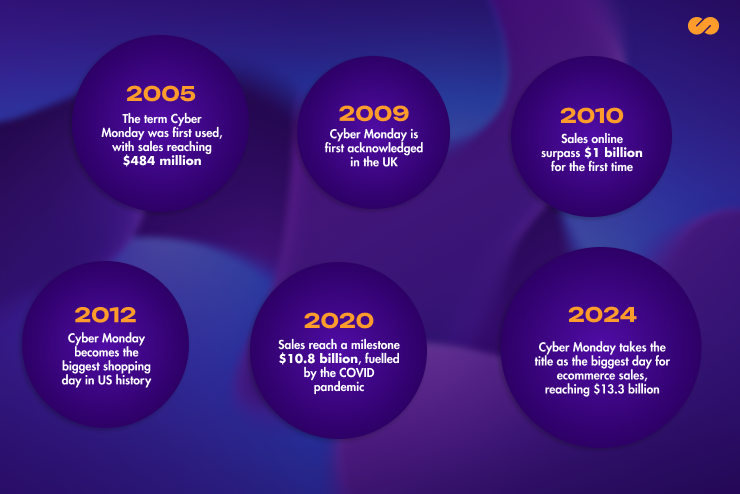
Since its introduction in 2005, Cyber Monday has grown exponentially and continues to break records.
We've broken down some of the key milestones from the past two decades of cyber mayhem.
2005 - The term Cyber Monday was first used, with sales reaching $484 million
2009 - Cyber Monday is first acknowledged in the UK
2010 - Sales online surpass $1 billion for the first time
2012 - Cyber Monday becomes the biggest shopping day in US history
2020 - Sales reach a milestone $10.8 billion, fuelled by the COVID pandemic
2024 - Cyber Monday takes the title as the biggest day for ecommerce sales, reaching $13.3 billion
How does Cyber Monday differ from Black Friday?
Black Friday originally started as an in-store shopping event. However, in recent years, businesses have shifted their focus to both digital and physical sales. Rightly so, as the event accounts for a huge chunk of annual sales.
Whereas Cyber Monday has always encouraged consumers to grab a last-minute deal online, as Black Friday comes to a close. A lot of retailers use this as an opportunity to run exclusive website offers in addition to existing Black Friday offers.
Why is Cyber Monday a big deal?
As it’s the culmination of the Black Friday period, buying intent is significantly higher on Cyber Monday. With businesses now running Black Friday deals for longer, many consumers use this time to research and hold out for the best deal.
This can trigger impulse purchases and the scarcity mindset. It’s proven that we value things more when they are limited and businesses can capatilise on this during Cyber Monday.
In 2024, as Cyber Monday drew to a close, $15.8 million was spent in the US every 60 seconds, between the hours of 8 pm and 10 pm.
Four ways to prepare for Cyber Monday
Audit and test your website
As the name suggests, Cyber Monday is predominantly an online event. While some businesses extend offers to physical stores, a large chunk of potential customers will be shopping online.
Traffic to your website is likely to be considerably higher, so it’s important to ensure that your digital experience is up to scratch. Ahead of Cyber Monday, audit and test key pages to spot any potential bugs or areas for improvement.
If you can streamline features such as navigation or the checkout process, it’s worth investing the extra time. Complicated or hard-to-navigate pages are one of the main reasons behind cart abandonment. This can ultimately lead to missed opportunities and lost revenue.
Optimise your website for mobile
Website traffic from mobile continues to grow rapidly each year. Recent data from May 2025 shows that 64% of visitors now come from mobile devices, which underpins the importance of device-specific optimisation.
If your website isn’t fully mobile optimised, this could be the make-or-break difference between a successful Cyber Monday. Key areas to focus on include:
- Website load speed
- Responsive layouts
- Optimising images
- Effective pop-up usage (too many or poorly designed pop-ups can affect user experience).
Personalise the customer journey
Cyber Monday is a highly competitive sales event where every retailer is fighting for the attention of website visitors. That’s why standing out is crucial to succeed, and personalisation can help you achieve this.
As the Black Friday period draws to a close, consumers have likely had their eye on specific products, waiting for the perfect moment to buy. This knowledge can help you drive personalised shopping experiences and conversions.
When customers feel understood and valued, they are more likely to become more loyal to a brand and make repeat purchases. In today’s digital age, where customer retention is becoming increasingly more expensive, building a loyal customer base is paramount.
Leverage mobile marketing
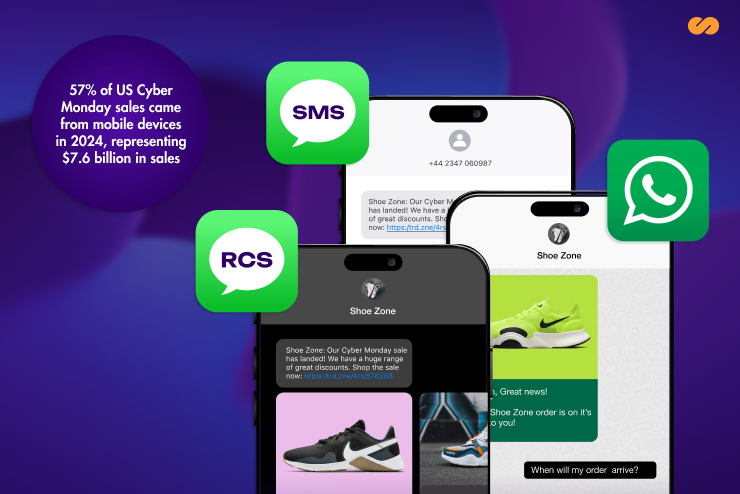
Data from Adobe shows that 57% of US Cyber Monday sales came from mobile devices in 2024, representing $7.6 billion in sales. With this shift in behaviour, it’s important to adapt your marketing strategy to reach your audiences.
New channels, including RCS and WhatsApp, are redefining the way businesses interact with consumers. Both offer a more personalised and interactive experience with rich features, including:
- High-resolution images, videos, and GIFs
- Clickable links
- Real-time typing indicators
- Read receipts
Whereas SMS and push notifications continue to be effective ways to drive urgency during time-sensitive events.
So, now you know how important Cyber Monday is, you can get ready to end the Black Friday period on a high note. Talk to us today to see how SaleCycle's conversion optimisation services can help you maximise conversions during both events.
Don’t forget to also download our Black Friday Survival Guide to learn how you can navigate the peak period like a pro.



